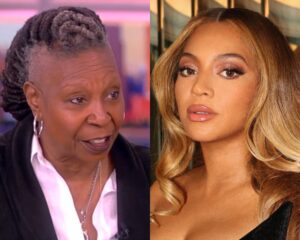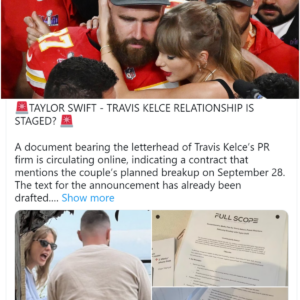Whoopi Goldberg’s recent declaration of solidarity with Beyoncé, vowing to depart from the United States alongside the music icon, has ignited a fervent debate within the entertainment industry and beyond. The announcement, which follows Beyoncé’s decision to relocate due to the reception of her country album, Cowboy Carter, marks a significant moment in the ongoing discourse surrounding genre, identity, and artistic freedom.
:max_bytes(150000):strip_icc():focal(791x326:793x328)/Whoopi-Goldberg-view-audience-032624-tout-fda4262c91f74c6c84f34144249b3540.jpg)
Beyoncé’s venture into country music with Cowboy Carter was met with a spectrum of reactions. Despite the album’s critical acclaim and innovative fusion of genres, it failed to wholly resonate with traditional country music listeners. While lauded for its boldness and artistic depth, the album faced skepticism from some purists questioning its authenticity within the country genre.
In response to this controversy, Whoopi Goldberg, known for her outspokenness on social and political issues, voiced her unwavering support for Beyoncé. On her talk show, Goldberg emphatically proclaimed, “Beyoncé is country, I can assure,” challenging the rigid boundaries imposed by industry gatekeepers and defending Cowboy Carter’s authenticity.
Goldberg’s decision to stand by Beyoncé and depart from the U.S. is more than a mere gesture of solidarity; it is a poignant statement against the cultural constraints that often stifle artists’ creative exploration. By aligning herself with Beyoncé’s pursuit of artistic freedom, Goldberg underscores the need for a more inclusive and flexible understanding of musical expression.

The ensuing reaction to Goldberg and Beyoncé’s planned departure has sparked widespread discourse on the expectations imposed on artists and the evolving nature of music genres. Industry experts argue that music, as a form of art, should be allowed to evolve and challenge traditional boundaries. Ethnomusicologist Dr. Lena Morris notes, “Genres have always evolved. What we consider ‘pure’ country today was itself a fusion of earlier musical influences.”
Supporters of Goldberg and Beyoncé contend that their decision to leave could shed light on the broader issue of how minority artists are often pigeonholed into specific genres, limiting their creative potential. Social media platforms have witnessed a surge of support through hashtags like #ArtistsWithoutBorders and #GenreEvolution, with fans and fellow artists advocating for a more inclusive music industry.
However, critics argue that Beyoncé’s and Goldberg’s departure may be perceived as an overreaction, suggesting that effecting change from within the industry might yield more significant results. Music critic Jason Keeler warns against the notion of surrendering, emphasizing the importance of challenging the status quo to expand the boundaries of country music.

As the debate unfolds, it becomes evident that Beyoncé’s Cowboy Carter and the ensuing controversy transcend mere musical discourse, touching on broader issues of cultural identity and artistic integrity. The discussions sparked by this controversy have the potential to reshape how artists are perceived and allowed to express themselves within the music industry.
Looking ahead, Goldberg and Beyoncé’s departure could serve as a catalyst for other artists facing similar dilemmas, signaling a shift towards a more globally interconnected and less genre-constrained music industry. As these two prominent figures prepare for their next chapter, the world watches with anticipation, awaiting the ripple effects of their bold choices on the cultural landscape.
News
Queen Beyonce In A See-through Lace Dress And Cowboy Hat With Her Husband Jay Z Attended The Event
Queen Beyonce In A See-through Lace Dress And Cowboy Hat With Her Husband Jay Z Attended The Event Queen Beyoncé, the legendary singer and global icon, made…
“David Bryan of Bon Jovi Stuns Audience with Unforgettable Surprise Performance”
“David Bryan of Bon Jovi Stuns Audience with Unforgettable Surprise Performance” Bon Jovi keyboardist David Bryan gave an “unforgettable” performance when he spontaneously took over the piano…
Jon Bon Jovi Hits the Town, and Gustavo Dudamel Takes the Stage
Jon Bon Jovi Hits the Town, and Gustavo Dudamel Takes the Stage This week, fans turned out for a new documentary about Jon Bon Jovi and took…
Jon Bon Jovi, 62, on New Documentary: ‘It’s Each of Our Individual Truths’
Jon Bon Jovi, 62, on New Documentary: ‘It’s Each of Our Individual Truths’ New Hulu series addresses Bon Jovi’s voice issues and Richie Sambora’s departure David Bergman/Hulu…
Archiving the Legacy: A Glimpse into Bon Jovi’s Wardrobe Vault( VIDEO)
Archiving the Legacy: A Glimpse into Bon Jovi’s Wardrobe Vault( VIDEO) Step into a room frozen in time, untouched by the passage of years, a sanctuary housing…
Madonna’s Spectacular Concert Set to Ignite Copacabana Beach
Madonna’s Spectacular Concert Set to Ignite Copacabana Beach In less than 20 hours, the eagerly anticipated concert by Madonna, set to draw over 1 million fans, will…
End of content
No more pages to load











